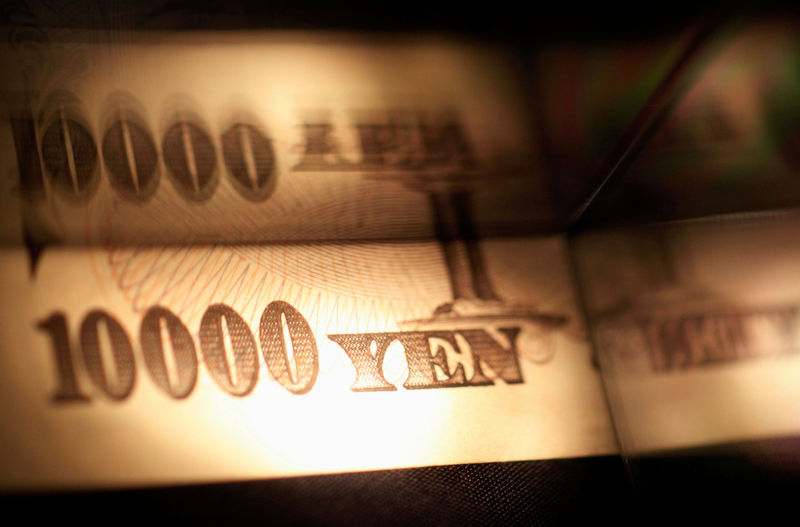By Hideyuki Sano and Stanley White
TOKYO (Reuters) - The yen rose on Tuesday as some investors tempered their optimism about the chances for a quick resolution to the U.S.-China trade war, which boosted so-called risk-off trades.
Global markets have been whipsawed by dramatic twists in the trade dispute this month. U.S. President Donald Trump on Monday flagged the possibility of a trade deal with China, days after both sides announced new tariffs.
The dollar came under additional pressure versus the yen as a decline in U.S. Treasury yields showed some investors still favored the safety of government debt.
The currency market also took some relief from a stronger-than-expected daily yuan fixing by the People's Bank of China, which many traders considered an attempt to slow the yuan's decline versus the dollar.
While Washington and Beijing have shown a willingness to return to the negotiating table to resolve their trade row, there are lingering concerns about a lack of a clear path toward resolving a dispute that has dragged on for more than a year and hurt global growth, corporate profits and investments.
"The dollar rallied overnight due to optimism about a trade deal, but there's a sense that the market has gotten a little ahead of itself," said Junichi Ishikawa, senior foreign exchange strategist at IG Securities.
"Some traders can book a little profit here. There are still so many issues that can trigger a clash between the United States and China. Treasuries shows the market is still somewhat skeptical."
The yen rose around 0.4% in Asian trading to 105.76 per dollar.
The yen, which tends to be bought in times of economic uncertainty, also rose around 0.6% versus the Australian and New Zealand dollars.
The dollar index (=USD) measuring the greenback against a basket of six major currencies was little changed at 98.011.
Benchmark 10-year U.S. Treasury yields (US10YT=RR) fell to 1.5249% in Asia. The yield curve was inverted as 2-year yields traded at 1.5326%, which is commonly considered a sign of an impending economic recession.
On Monday the greenback rebounded from near eight- month lows of 104.46 yen after some signs of rapprochement between Washington and Beijing soothed investors' nerves.
Speaking on the sidelines of the G7 summit of world leaders in France on Monday, U.S. President Donald Trump said Chinese officials had contacted U.S. trade counterparts overnight and offered to return to the negotiating table.
Trump's comments sparked a wave of so-called risk-on trades, which initially boosted the dollar, weakened safe-haven currencies, and lifted stock markets.
However, some doubts have crept into markets as a Chinese Foreign Ministry spokesman said he had not heard that a phone call between the two sides had taken place. The Commerce Ministry, which typically releases statements on trade calls, did not respond to a request for comment.
Prior to market opening, the People's Bank of China (PBOC) lowered its official onshore yuan midpoint to 7.0810 per dollar. That was a fresh 11-1/2-year low, but still at a stronger setting than traders had expected.
In onshore trade the dollar rose 0.13% to 7.1615 yuan , strengthening less than 0.76% from Monday, as traders said the Chinese central bank kept the yuan from weakening faster.
Attempts to slow the greenback's rise against the yuan also weighed the dollar down versus the yen, traders said.
"I was quite surprised by the big gains in the dollar/yen overnight. But it is unclear what the U.S. and China will do next, and I would expect the dollar to consolidate for the time being," said Kyosuke Suzuki, director of forex at Societe Generale (PA:SOGN).
The euro was quoted at $1.10985 (EUR=), little changed on the day.
Sterling traded at $1.2216 , after a 0.5% fall on Monday as investors reassessed whether British Prime Minister Boris Johnson had made any progress in convincing the European Union to renegotiate the Brexit agreement.

Johnson said on Monday he was prepared to take Brexit talks with the European Union down to the very last minute before the Oct. 31 exit deadline, and if necessary to take a decision to leave without a deal on that day.